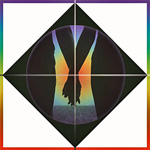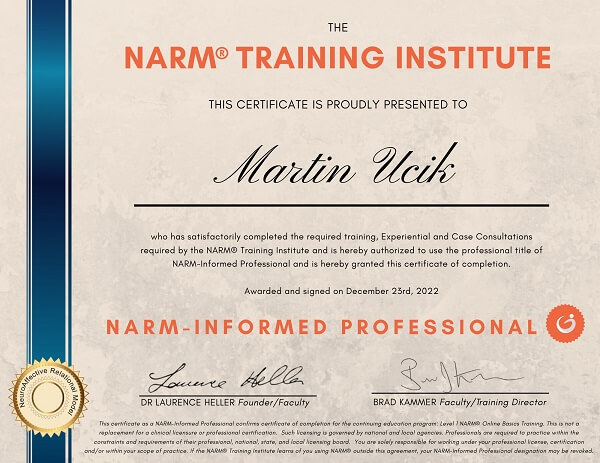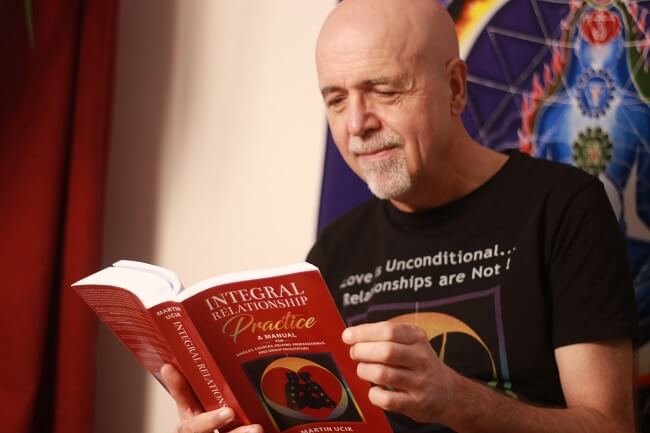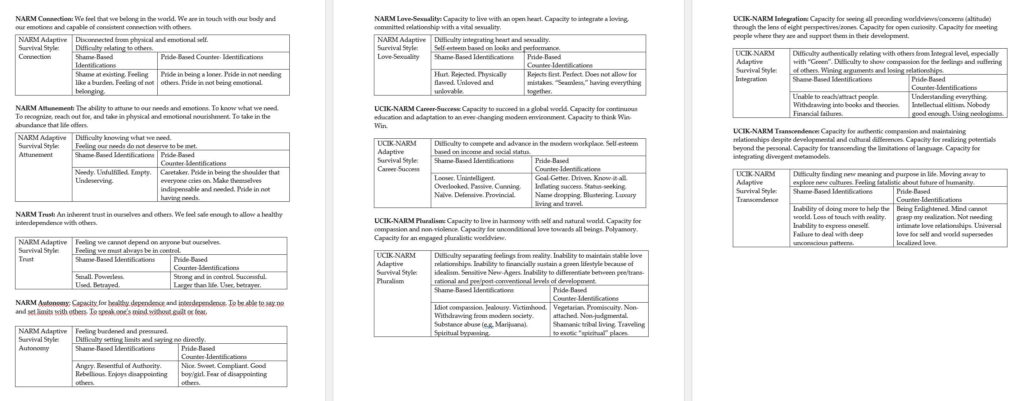Martin Ucik
NARM® Informed Professional
Martin is a NARM® Trauma Informed Integral Relationship Author, Trainer, and Consultant who supports singles and couples in co-creating healthy integral love relationships.
NARM® and the Integral Relationship Model:
The NeuroAffective Relational Method/Model (NARM) is a somatically based “bottom-up” and mindfulness related “top-down” method for healing complex developmental trauma and attachment wounds that were created through persistent caregiver failures and miss-attunement during different phases of childhood that prevent children from developing their age-appropriate core capacities and potentials for Archaic “connection”, Magic “attunement” and “trust”, Egocentric “autonomy”, and Mythic “love/sexuality”.
NARM® identifies related adaptive survival styles that abused and neglected children developed for each capacity through disconnecting from their authentic needs and feelings. This later distorts and dominates their sense of self in adulthood through false shame- and pride-based counter ego identifications (see chart below) to avoid their underlying pain and grief which disconnects them from their authentic self or true identity, and thus their capacity to securely connect with self and others and to feel fully alive.
Even though NARM emphasizes that it is not goal-oriented (a performative contradiction), its stated intention is to support clients in restoring connection to their authentic self and others, along with the capacities for self-regulation and feeling fully alive, and, implicitly, to live on purpose in healthy love relationships. Thus, NARM perfectly complements and integrates with the 24 Modules of the Integral Relationship Model as shown below and vice versa.
The first few pillars of the NARM healing method are similar to the “Undefended Love – Healing our Shadow” process in the IRM Modules 18 and 19. Both support clients to get in touch with their emotional fight-flight-freeze reactions such as anger and shame, and the underlying unconscious vulnerable feelings such as grief and sadness that create disconnection from their true identity or authentic self.
Unlike the more cognitively and behaviorally (CBT) oriented affirmations and insights for each of the possible 21 false identities that practitioners receive in Module 19, NARM leads clients into a much deeper healing process by getting more and more in touch with somatically felt connection and disconnection from self and others. This supports them to increasingly disidentify (see Spiritual Development Module 12) from these feelings and develop adult consciousness with the capacity for agency (see Feminine-Masculine Polarities Module 11) to relate to themselves and others through authentic (1) connection with their body and emotions, (2) attunement to their feelings and being-needs, (3) trust in their ability to depend on others, (4) autonomy to set healthy boundaries and speaking their truth, and (5) integrating heart/love with a vital sexuality.
Click here for larger image
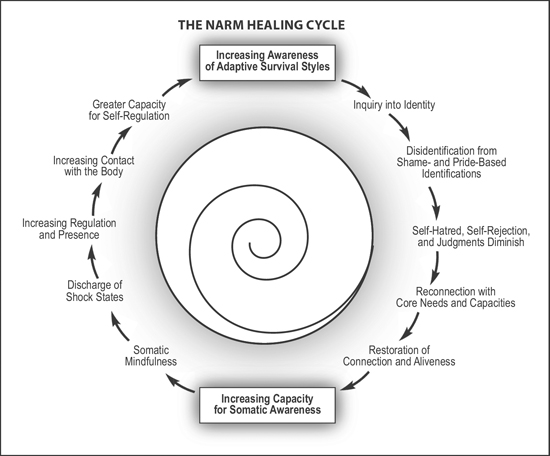
The NARM Healing Cycle (starts from bottom) with two o’clock disidentification and six o’clock mindfulness
In the table below, you find suggestions how the NeuroAffective Relational Method (NARM®), as outlined in the books Healing Developmental Trauma and The Practical Guide for Healing Developmental Trauma, and the NARM Basic Online Training can benefit and complement the Integral Relationship Model (IRM), as outlined in the latest book Integral Relationship Practice: A Manual for Singles, Couples, Helping Professionals, and Group Facilitators and the 26 Week Certified Professional Training and vice versa.
NARM®benefits for the Integral Relationship Model and vice versa:
| NARM benefits for IRM | IRM benefits for NARM | |
| IRM Practice Modules | 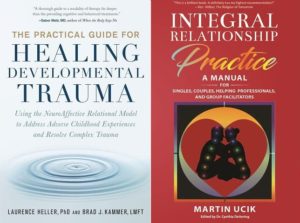 |
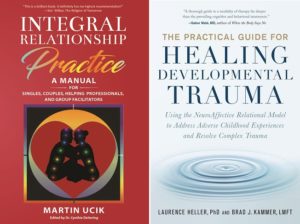 |
|
Preliminary Practice Module Ego-Transcendence and Unconditional Love |
Preventing potential nervous system dysregulation and re-traumatization during meditation and Love Circle (See first NARM book HDT page 26-27). | Practicing deep ego-transcending mindfulness meditation and 50/50 connection in the Unconditional Love Circle. |
|
Four Dimensions of Being and Relating |
Integrating developmental trauma aspects into all four dimensions of being and relating. | Considering the developing (authentic) self in its interior/intentional, exterior/behavioral, and individual/singular, and collective/plural dimensions of being and relating. |
|
Archaic, Magic, and Egocentric Stages |
Integrating connection, attunement, trust, and autonomy capacities, and healing of shame/pride-based adaptive survival styles and identifications and all related aspects (brilliant!) | Considering the development and integration of embodied basic capacities and transcending limited views at the first three stages of consciousness development. |
| Practice Module 3 Mythic and Rational Stages |
Integrating love/sexuality and purpose/success capacities, and healing of shame/pride-based adaptive survival styles and identifications. | Considering the development and integration of embodied basic capacities and transcending limited views at the fourth and fifth stage of consciousness development. |
|
Pluralistic Stage |
Integrating pluralistic sensitive-self capacities and healing of shame/pride-based adaptive survival styles and identifications. | Considering the development of embodied basic capacities and transcending limited views at the sixth stage of consciousness development. |
|
Integral and Transpersonal Stages |
Integrating of integral and transpersonal capacities and healing of shame/pride-based adaptive survival styles and identifications. | Considering the development of embodied basic capacities and transcending limited views at the seventh and eighth stage of consciousness development. |
|
Nonviolent Compassionate Communication |
Differentiation of NARM default and primary emotions. Understanding of developmental trauma reactions versus unmet authentic being-needs. | Broader awareness and expression of feelings, emotions, and being-needs. Differentiation of feelings, interpretations, and strategies. |
|
Need-Based Communication |
Differentiation of NARM default and primary emotions. Understanding of developmental trauma reactions versus unmet authentic being-needs. | Considering from which level of first-tier consciousness clients make implicit and explicit feminine/masculine validity claims to goodness, truth/truthfulness, beauty, and functionality. |
|
Integral and Transpersonal Communication |
Differentiation of default and primary emotions. Understanding of developmental trauma reactions versus unmet authentic being-needs. | Considering second-tier Integral and Transpersonal communication, including the capacity for curiosity, compassion, dialectic, advancements into novelty, absenting absences, and post-verbal communication. |
|
Biological Differences and Learned Gender Roles |
Understanding of gender related individual and collective developmental trauma responses. | Considering differing developmental trauma responses based on biological sex (body, hormones, brain development) and learned gender roles and identities. |
|
Avoiding the Fear–Shame Downward Spiral |
Further differentiating shame and pride-based (counter) identification. Integrating NARM healing process in avoiding downward spiral and returning to love. | Considering and integrating differences in male/female shame responses and primal fear versus shame in females. |
|
Feminine-Masculine Polarities |
Integrating the role of developmental trauma in the inability to embody healthy feminine and masculine polarities in both sexes. | Considering healthy and unhealthy agency, and balancing it with the capacity for healthy communion. Differentiating healthy and unhealthy ascending (bottom-up) and descending (top-down). |
|
Spiritual Development |
Avoiding nervous system dysregulation during meditation and spiritual state-stages (HDT page 26-27) | Considering five state-stages of spiritual development and capacities for disidentification. |
|
Sexual Development |
Integrating developmental trauma responses and blocks related to the incapacity of integrating an open heart with a vital sexuality. | Considering the integration of five state-stages of the heart and sexual development. |
|
Anima/Animus complex Development |
Super important to integrate developmental trauma related aspects of Anima/Animus complex development in males and females. | Considering the integration of five stages of Anima/Animus complex development and why women in stages one and four may seek therapy while rejecting being in intimate love relationships. |
|
Personality Types and The Five Love Languages |
Integrating the 10 NARM therapeutic Personality Spectrums (PG 261-295) and aspects of developmental trauma in identifying personality types and expressing Love Languages. | Considering a wider range of personality types, including “The Big 5/6”, and the five Love Languages for the co-creation of healthy love relationships. |
|
Enneagram Types and Instincts |
Integrating developmental trauma aspects in identifying and expressing Enneagram types and Instinctual Variants in healthy ways. | Considering the nine types of the Enneagram and three Instinctual variants for healing developmental trauma and the co-creation of healthy love relationships. |
|
Attachment Styles |
Gain a much deeper understanding of how developmental trauma formed attachment styles and how to move towards secure attachment. | Considering integrating more explicitly that attachment wounds are often only triggered and healed in intimate love relationships. |
|
The Unconscious and Emotional Availability |
Benefit from the understanding of ACE’s and NARM differentiation of “default” (IRM primary) emotions and underlying “primary” (IRM vulnerable) feelings. | Integrate forms of the ground, archaic, embedded, and emergent unconscious that are not caused by developmental trauma and may still lead to adaptive survival styles. |
|
Healing your Shadow/Unconscious |
Not pushing practitioners into re-experiencing trauma. Supporting practitioners in developing agency and naturally identifying their authentic self and core capacities and thus create lasting healing instead of CBT-like short-term affirmations. | Considering the six-step process and differentiating 21 “False Identities” and the possible helpfulness of affirmations that point to the true identities that lay people can use to create empathy and resolve relational conflicts and as a gateway for deeper healing. |
|
Forms, Levels, and States of Love |
Integrating NARM into creating deeper intimacy, passion, and commitment; navigating states of love; and greater understanding of co-dependence and capacity for dependence/interdependence. | Bring awareness to triangular theory of love, states of love, and inter-being and inter-becoming as more advanced foundations for commitment and healthy relationships. |
|
Personality Disorders (PD’s) |
Not objectifying practitioners with PD’s, and a deeper understanding of the role that developmental trauma plays in the creation and healing of symptoms. | Considering that personal development, spiritual, and healing groups often attract traumatized people with PD’s who can be highly (sexually) seductive, needy, and sometimes disruptive. Considering the 22 stages of decline that relationships between empaths and people with PD’s often go through (IRP page 412). |
|
Biological and Transformational Purpose |
Understanding how developmental trauma may prevent people from fully living their biological purpose and awakening to and living their transformational purpose of learning, healing, growing, and awakening. | Add capacity to living our biological and transformational purpose to the five NARM core needs/capacities for well-being. |
|
Transcendental Purpose and Love |
Understanding how developmental trauma may prevent people from awakening to, identifying, and living their transcendental purpose of creating more goodness, truth, beauty, and functioning. | Add capacity for awakening to, identifying, and living our transcendental purpose of creating more goodness, truth, beauty, and functioning to the five NARM core needs/capacities for well-being. |
|
Soulmates |
Understanding how developmental trauma may prevent people from defining, identifying, attracting, finding, or inviting their soulmate and to co-create a healthy relationship. | Consider the importance of soulmate relationships for healing developmental trauma and creating positive personal and social transformation. |
|
Co-Creation at the Level of the Seven Chakras |
Understanding how different stages of developmental trauma prevent co-creation at one or more of the seven chakras. | Expand “relationship” (the “R” in NARM) beyond the client-therapist relationship to the ability to co-create with a soulmate in a love relationship at the level of all seven chakras. |
|
Why Relationships Matter |
Accept that some people are so deeply traumatized that they cannot enter into healthy love relationships or can’t see the importance of love relationships for personal transformation and the co-creation of a peaceful and sustainable future for humanity. | Consider adding the importance of healing developmental trauma for the co-creation of healthy sustainable love relationships and social transformation towards a peaceful and sustainable future for all humanity. |
Support Integral Relationship
Do you appreciate Martin’s work and want to make a financial contribution? Any amount, small or large will support him and his team to produce more inspiring and helpful content and make the world a better place. Thank you very much!
